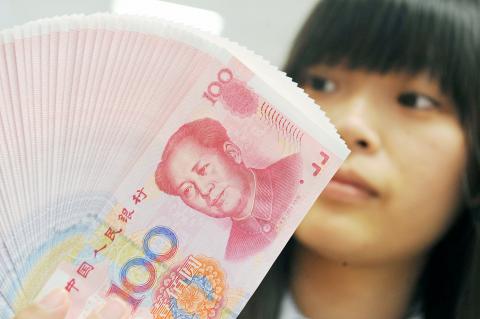Taiwan Financial Holding Co (台灣金控), a fully state-owned financial services provider, aims to accelerate its expansion in the Asia-Pacific region and increase profit contributions from overseas operations this year, chairperson Liu Teng-cheng (劉燈城) said yesterday.
Despite lingering downside risks worldwide, the bank-oriented conglomerate is confident about growing profits this year, aided by its yuan business, after booking NT$7.31 billion (US$246.95 million) in net income last year, more than meeting its target of nearly NT$7 billion, Liu said.
The banking arm, Bank of Taiwan (台灣銀行), will seek to deepen its presence in China this year after setting up its first Chinese branch in Shanghai in July last year, Liu said.

Photo: CNA
The branch may apply to offer yuan products and services to Taiwanese customers based in China after proving profitable one year after its establishment, Liu said.
Yuan lending operations can help boost interest income because borrowing costs for the yuan are much higher than for the New Taiwan dollar.
Bank of Taiwan posted a net interest margin of below 1 percent last year, lagging behind the industry average of 1.5 percent, as the lender struggled to digest its loanbook totaling NT$3 trillion, the largest among domestic lenders, Liu said.
At home, Bank of Taiwan aims to build up its yuan deposits to 5 billion yuan (US$802.3 million) by the end of the year, topping the 3 billion yuan target of another state-run bank, Hua Nan Commercial Bank (華南銀行).
“We hope 80 percent of our [NT dollar] time deposits will switch to yuan, allowing the bank to lower its capital costs,” the official said.
Bank of Taiwan is offering an additional 50 basis points in interest rates for yuan time deposits of different durations, Liu said, adding that the bonus rises to 100 basis points for deposits in excess of 100,000 yuan.
The lender’s ambition is not limited to China, but extends to other populous cities in the region, such as Mumbai in India, Sydney in Australia and Phnom Penh in Cambodia, Liu said.
While looking to expand its business footprint, the bank is not seeking merger and acquisition opportunities, but will focus on organic growth, Liu said.
The lender yesterday set up an insurance brokerage subsidiary to diversify its product lines and promote cross-selling benefits at its 164 branches nationwide.
The insurance brokerage could quickly win the trust and acceptance of the public, because it is the only one that is 100 percent owned by the government, Liu said.

STEEP DECLINE: Yesterday’s drop was the third-steepest in its history, the steepest being Monday’s drop in the wake of the tariff announcement on Wednesday last week Taiwanese stocks continued their heavy sell-off yesterday, as concerns over US tariffs and unwinding of leveraged bets weighed on the market. The benchmark TAIEX plunged 1,068.19 points, or 5.79 percent, to 17,391.76, notching the biggest drop among Asian peers as it hit a 15-month low. The decline came even after the government on late Tuesday authorized the NT$500 billion (US$15.2 billion) National Stabilization Fund (國安基金) to step in to buoy the market amid investors’ worries over tariffs imposed by US President Donald Trump. Yesterday’s decline was the third-steepest in its history, trailing only the declines of 2,065.87 points on Monday and

TAKING STOCK: A Taiwanese cookware firm in Vietnam urged customers to assess inventory or place orders early so shipments can reach the US while tariffs are paused Taiwanese businesses in Vietnam are exploring alternatives after the White House imposed a 46 percent import duty on Vietnamese goods, following US President Donald Trump’s announcement of “reciprocal” tariffs on the US’ trading partners. Lo Shih-liang (羅世良), chairman of Brico Industry Co (裕茂工業), a Taiwanese company that manufactures cast iron cookware and stove components in Vietnam, said that more than 40 percent of his business was tied to the US market, describing the constant US policy shifts as an emotional roller coaster. “I work during the day and stay up all night watching the news. I’ve been following US news until 3am

Six years ago, LVMH’s billionaire CEO Bernard Arnault and US President Donald Trump cut the blue ribbon on a factory in rural Texas that would make designer handbags for Louis Vuitton, one of the world’s best-known luxury brands. However, since the high-profile opening, the factory has faced a host of problems limiting production, 11 former Louis Vuitton employees said. The site has consistently ranked among the worst-performing for Louis Vuitton globally, “significantly” underperforming other facilities, said three former Louis Vuitton workers and a senior industry source, who cited internal rankings shared with staff. The plant’s problems — which have not

TARIFF CONCERNS: The chipmaker cited global uncertainty from US tariffs and a weakening economic outlook, but said its Singapore expansion remains on track Vanguard International Semiconductor Corp (世界先進), a foundry service provider specializing in producing power management and display driver chips, yesterday withdrew its full-year revenue projection of moderate growth for this year, as escalating US tariff tensions raised uncertainty and concern about a potential economic recession. The Hsinchu-based chipmaker in February said revenues this year would grow mildly from last year based on improving supply chain inventory levels and market demand. At the time, it also anticipated gradual quarter revenue growth. However, the US’ sweeping tariff policy has upended the industry’s supply chains and weakened economic prospects for the world economy, it said. “Now